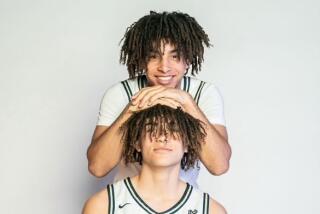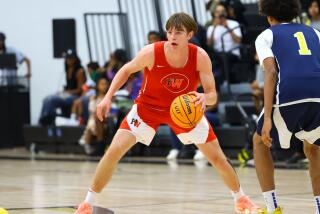Natural Selection
PEORIA, Ill. — Will it play in Peoria?
The famous question dates to vaudeville days, when producers tried out new shows on Peorians, believing their opinions to be reflective of mainstream America. If a production didn’t work in Peoria, so the thinking was, it probably would have to be rewritten, recast or maybe even canceled.
But if it played in Peoria, it could play anywhere.
Peoria is still used as a national measuring stick for new products, Madison Avenue regarding it as emblematic of middle-American taste, a bellwether of countrywide views toward politics and other national trends.
The latest to test this theory, some might say, will be Shaun Livingston, who played well enough in Peoria that last week the Clippers made him the fourth pick in the NBA draft, turning Livingston into the first true point guard to jump directly from high school to lottery pick.
In every sense, he is a product of Peoria. Livingston, who will turn 19 Sept. 11, has spent all of his years in this city of about 112,000 hard by the west bank of the Illinois River, about 2 1/2 hours southwest of Chicago.
The only child of parents who divorced when he was a toddler, he lives in a comfortable, two-story brick house on a tree-lined street in the middle-class West Bluff neighborhood, about a mile from Bradley University. He shares it with his primary caregivers, his 74-year-old grandfather and 40-year-old father.
Eventually growing to 6 feet 6, Livingston honed his basketball skills all over the city. Starting at home -- “He dribbled so much in the house that the plaster was falling off the walls,” his father, Reggie, once noted -- Livingston took his game at an early age to the Carver Center, a safe haven on the south side of town for disadvantaged, mostly African American youths.
In the tiny, vinyl-tile-floored gym at Concordia Lutheran School, he sparked his sixth-, seventh- and eighth-grade teams to a UCLA-like three-year unbeaten streak.
At Peoria Central High, where he drew national attention by helping the Lions to a 62-3 record the last two seasons, he was so charismatic that his commitment to Duke, announced at a news conference in November, inflamed Illinois boosters.
At Carver Arena downtown, the playmaking prodigy twice led Peoria Central to state championships in the large-schools division, capping his high school career with his coronation in April as Mr. Basketball in Illinois. He averaged 18.5 points, six rebounds and six assists as a senior.
Along the way, playing an untold number of pickup games at Bradley’s charming Robertson Fieldhouse, Livingston developed a reputation as a ballhandling wizard, his supporters generally agreeing that he was the best point guard to come out of Illinois since Chicago-bred Isiah Thomas some 25 years ago.
One breathless analyst called him “a smaller Magic Johnson with the flair of Pete Maravich,” as if a player nicknamed Magic was somehow lacking in panache and comparing a high school kid to only one legend wouldn’t do him justice.
Thursday’s draft in New York was covered by all three network affiliates in Peoria, one of which, WHOI-TV, hosted a packed draft-night party at a downtown bar and produced a 30-minute show about Livingston that was shown Saturday night.
“I’ve been here seven years,” the station’s news director, Amanda Wozniak, said Tuesday, “and I can’t tell you the last time all three networks sent crews to cover the same story. That’s just not something we do, so this was big.”
Said Gary Childs, a longtime Peoria resident and assistant sports editor at the Peoria Journal Star: “This is our sports story of the year, by far.”
It was pretty exciting for the Clippers too. Lacking a consistent playmaker, they are thought to have been hot on Livingston for months after again sinking to the bottom of the Western Conference last season.
After Livingston’s season ended in March, a scout told his coach that the Clippers would draft Livingston, no matter where they landed in the lottery.
Probably the only person not applauding this turn of events is Livingston’s worrisome grandfather, Frank Livingston, an ex-Marine and Korean War veteran who wanted Shaun to honor his commitment to Duke.
Instead, the younger Livingston will be slotted into a three-year, $8.1-million contract and live in a big city, with all the temptations and potential pitfalls implied.
Grandpa is apprehensive about sending him off to Los Angeles.
“Or any other place,” the family patriarch said this week, entertaining a visitor in the living room of his tidy home. “He’s a young kid, and he’s an immature kid. He needs to go to Duke at least a year, needs to be in one of them environments where he’d be nurtured like he has been by every coach he’s ever been with....
“The NBA is not like college. Having money is a bad thing for kids, and a bad thing for adults. He’s going to have all kinds of people pretending to be his friend. He’s going to have all kinds of people conning him. I just wonder where the true friends are going to come from. That’s my concern. It’s always been my concern....
“Like the Chinese say, ‘Success has a thousand fathers and failure is an orphan.’ And that’s what it’s about.”
He implies that, at the first sign of trouble, he’ll be on the next plane to Los Angeles, where his grandson’s live-in advisor will be Artie Jones, 33, younger brother of Livingston’s former AAU coach, Verdell Jones.
Verdell Jones and Livingston’s father, longtime friends, had a falling-out over Jones’ influence on the young point guard. But Livingston still regards Jones as a mentor and refers to him as his godfather.
Meanwhile, Reggie Livingston was arrested June 16, in an incident reportedly involving a girlfriend, on charges of unlawful restraint, home invasion, domestic battery and interfering with the reporting of domestic violence. His relationship with his son reportedly is strained.
Livingston’s mother, Ann, is remarried and not involved much in his life, though mother and son have recently been in contact.
So, his grandfather frets.
A year ago, he looked forward to sending his grandson off to college, not the NBA. He had always considered young Shaun a scholar, he said, a talented kid who sang in the church choir and with a select, citywide youth group.
But early on, his burgeoning basketball skills dwarfed all else.
At 7, Shaun reportedly was dribbling the ball between his legs, back and forth, all the time. In fourth grade, he played on his school’s eighth-grade team. His sixth-, seventh- and eighth-grade teams were 87-0, winning two state titles.
At Concordia Lutheran, he was introduced to Alexander Wolff, who recounted the meeting in his 2002 book, “Big Game, Small World,” in which he traces the origin of the crossover dribble to Peoria.
“I ... learned two things about his precocious ability to dribble,” Wolff wrote of Livingston. “One was that he had grown up without a hoop in the driveway, which led him to take a ball down to the basement and dribble like a fool. The other was that, as Shaun said, ‘Breaking a guy off the dribble, it just feels good.’
“ ‘Better than a dunk?’ I asked.
“ ‘I don’t know. I haven’t dunked yet.’ ”
He would in time, of course, but what set Livingston apart, even at such a young age, were his ballhandling and passing skills.
“His court awareness was phenomenal,” said Billy Halstead, an assistant coach at Richwoods High when Livingston played there as a freshman and sophomore. “He could see things that no one else could see.
“It’s amazing how he threads the needle and gets the ball to places you would think would be totally impossible without dropping it in from a helicopter.”
Said Chuck Buescher, Livingston’s recently retired coach at Peoria Central, “His basketball IQ is unbelievable. He is the smartest player I’ve ever coached.”
But as often as he wowed them in Peoria, Livingston really made a name for himself on the national summer touring circuit of camps and tournaments, playing for Verdell Jones’ Ft. Sooy (For the sake of our youth) No Limit team.
Last summer at the ABCD camp in New Jersey, where the country’s best high school players showcased their skills for college recruiters and pro scouts, he outplayed Sebastian Telfair of Brooklyn, who many were predicting would be the first point guard to jump from high school to the NBA.
He was rated the No. 1 high school player in the country, the first Illinois player so dubbed since Kevin Garnett nearly a decade ago.
Still, Livingston said last August that there was “no chance” he would jump to the NBA, and apparently he believed it too.
But soon after he unfolded a yellow piece of paper and announced at a November news conference that he would be signing with Duke, turning down Illinois, Arizona and North Carolina, his thoughts started to shift.
In early December, Peoria Central defeated Santa Ana Mater Dei at Benton, Ky., and Seagoville of Texas at the KMOX Shootout in St. Louis, a high-profile event that drew some 40 NBA scouts and executives.
“And Shaun was unbelievable,” his coach said.
After the game at St. Louis, Buescher recalled, an NBA scout said of Livingston, “I don’t think he’ll ever play a day in college.”
After Christmas, three to five scouts showed up at every Peoria Central game and midway through the season, it dawned on Livingston that the NBA was a real option for him. After the season, a second consecutive state championship secure, Livingston started driving up to Chicago for workouts with Tim Grover, Michael Jordan’s former trainer, and “developing good reading habits,” Buescher said.
Pro scouts, he read, wanted him to add weight. He weighed 186 pounds at the predraft camp in Chicago in early June, 15 more than when Buescher weighed him last November.
In Chicago, he worked out for the Clippers and met over lunch with General Manager Elgin Baylor, Coach Mike Dunleavy and Barry Hecker, the club’s director of player personnel.
It was clear, his grandfather said, that the Clippers wanted him. Over his grandfather’s objections, he hired an agent, former Bradley player Henry Thomas. He broke the news to Duke Coach Mike Krzyzewski.
“I felt like I was getting good feedback from the people that really mattered,” he said Tuesday. “Not just mock drafts and chat-room talk.”
He flew out to Los Angeles for another workout with the Clippers, this one in El Segundo. The Clippers drafted him, raving about his tremendous upside. Livingston hoped his grandfather understood and would have faith in him.
“In life, you can get hired on potential or you can get hired on achievement,” his grandfather said. “Achievement is what you have did. He don’t have any achievement in basketball in college; he has some in high school.
“But they’re looking at potential: What you could possibly do if someone gave you the opportunity. Now that’s where we’re at.”
Later, though, he predicts that Shaun will be a rookie success.
In Peoria, it’s unanimous.






